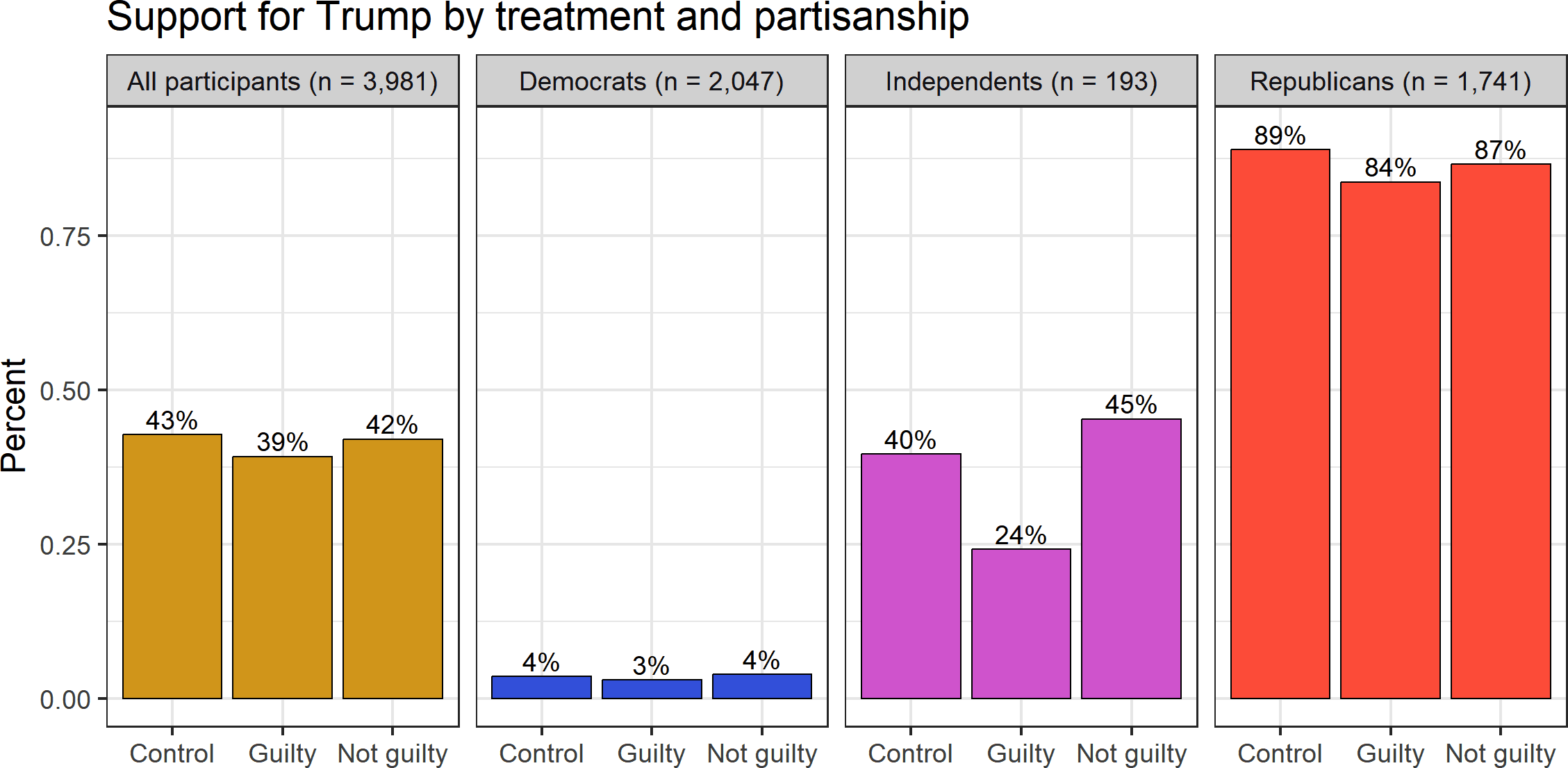New Survey: ‘Guilty’ Verdict in New York Criminal Trial Could Result in Measurable Harm to Support for Former President Trump
In This Resource
Published May 29, 2024
A new survey experiment finds no evidence that an acquittal of former President Trump at his New York criminal trial would affect his support among voters. In line with existing research, the new survey experiment also finds measurable harm to Trump’s support if a jury finds him guilty. Trump’s criminal indictment in New York centers on 34 counts of falsifying business records to hide damaging information from voters before and after the 2016 election.
States United Action, in partnership with YouGov, conducted a nationally representative survey of nearly 4,000 registered voters between April 23 and May 15, 2024. In particular, we wanted to better understand Americans’ perspectives on potential conviction and acquittal outcomes for former President Trump in his criminal trials.

The results show no evidence that an acquittal of Trump would affect his level of support among voters. Levels of support are nearly identical between the control group (which received no information about the outcome of Trump’s criminal trials) and both the Democrats and Republicans who saw the “not guilty” treatments. Among independents, support for Trump is slightly higher in the “not guilty” condition than it is in the control condition, but this difference isn’t statistically significant (p = 0.52).
In line with existing research, the results also show that a jury conviction would meaningfully reduce Trump’s support. Among Republicans, a guilty verdict by a jury decreases support by about 5 percentage points. This difference is statistically significant and substantively meaningful.
For independents, a guilty verdict by a jury decreases support for Trump by about 16 percentage points. While not statistically significant at traditional levels for this survey, it’s close (p = 0.06)—and given the small number of independents in our sample, this is suggestive of potential harm among independents for Trump from a guilty verdict.
Overall, the findings indicate an important dynamic to consider as the press and public process the forthcoming verdict by the jury: A guilty verdict by a jury reduces support for Trump in potentially meaningful ways for the upcoming election, whereas a not-guilty verdict by a jury has no observable impact.
*In keeping with best research practices, we classify independent voters who reported “leaning” toward either the Democratic or Republican parties as partisans. Therefore, we define “independents” as those respondents who professed no partisan attachments whatsoever.
This survey is based on 3,981 interviews conducted on the internet of U.S. adults. Participants were drawn from YouGov’s online panel and were interviewed between April 23 and May 15, 2024. Respondents were selected to be representative of American adults. Responses were additionally weighted to match population characteristics with respect to gender, age, race/ethnicity, education of registered voters, and U.S. Census region based on voter registration lists, the U.S. Census American Community Survey, and the U.S. Census Current Population Survey, as well as 2020 presidential vote. The margin of error for this survey is approximately ± 1.7 percentage points, though it is larger for the analysis of partisan subgroups described above. Therefore, sample estimates should differ from their expected value by less than the margin of error in 95% of all samples. This figure does not reflect non-sampling errors, including potential selection bias in panel participation or measurement error.
Exposure to treatments was block randomized on participants’ partisan identities to maximize statistical power when comparing the effects of the treatments to one another.
We tested our expectations using logistic regression models in which we predicted support for Trump using indicators for which treatment participants received. Contact info@statesunitedaction.org for more details.
The text of the experimental treatments follows.
Control
“As you may know, Donald Trump is facing a number of felony criminal charges in state and federal courts. Suppose that none of these cases have been resolved by Election Day.”
Guilty
“As you may know, Donald Trump is facing a number of felony criminal charges in state and federal courts. Suppose that Donald Trump is found guilty by a jury of one or more of these criminal charges.”
Not guilty
“As you may know, Donald Trump is facing a number of felony criminal charges in state and federal courts. Suppose that Donald Trump is found not guilty by a jury of all of these criminal charges.”
After participants were exposed to a treatment, they were asked the following question:
Would you vote for [Joe Biden, Donald Trump], someone else, or would you not vote?
Joe Biden, Donald Trump, Someone else, I would not vote, Don’t know/Not sure